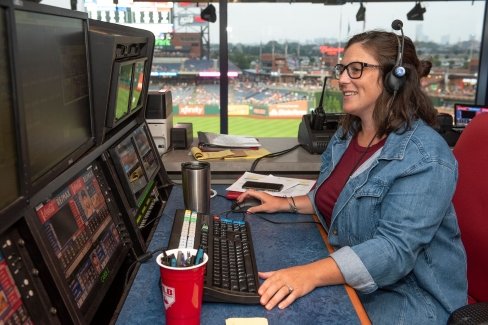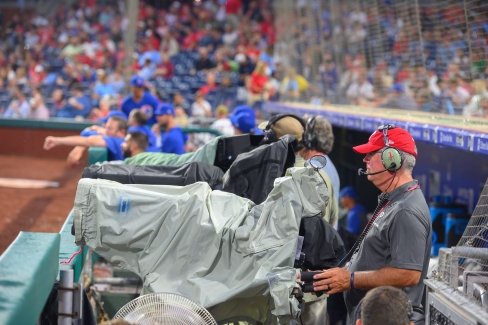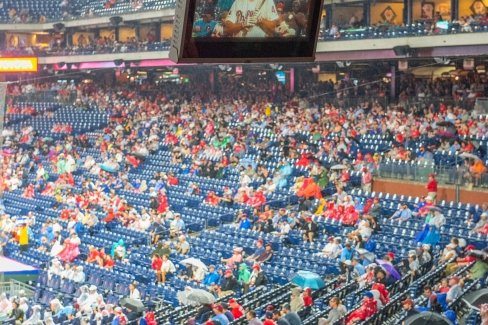PhanaVision: Students, faculty & alumni help run Phillies big screen production
PhanaVision: Students, faculty & alumni help run Phillies big screen production

Director Chris Winkler calls out commands as cameras, wrapped in canvas and plastic to shield against an intermittent August rain, come alive.
“I see good shots on 3, 4, 2, 1… Standby on 3… Ready 5… Boy, we’re up past this kid’s bedtime… Standby pink on a clear dissolve.”
Though it sounds as if it might be, this is no movie set.
Nor is it television.
This is PhanaVision.
Winkler, an assistant professor in Rowan’s Department of Radio, Television & Film in the College of Communication & Creative Arts, is also one of four directors who call closed-circuit camera shots during some 80 home games a year for the Philadelphia Phillies.
Winkler’s direction, and the resulting plays, animations and on-screen high jinks that camera operators catch – many of them courtesy of Philly’s beloved, frenetic Phanatic – are as much a part of the in-stadium fan experience as home runs, strikeouts and head-first, dust-covered, play-at-the-plate dives.
“I’m like a conductor,” Winkler explained. “I work closely with the game producer who determines what elements, features and promotional elements need to run during the game.”
Winkler, who like almost everyone on the PhanaVision crew is a freelance, part-time contractor, began as a camera operator in 2006 and moved into the director’s chair three years ago. As such, he calls shots to operators of four fixed cameras and two roving operators for the in-stadium feed who, along with producers and behind the scenes technicians, turn what could be straight game coverage into a show.
These are the folks who capture for in-stadium viewing not only the game but all the candid shots, wide shots, kiss shots and fun shots for the giant screen.
But first, it’s about covering the game.
“As soon as the batter steps into the box, everything comes to a full stop,” Winkler said.
Rowan in the house
Of the roughly 60 members of the freelance PhanaVision and Video Services crew, Rowan students, alumni and faculty make up more than a quarter of the personnel. Included among them: Dan Baker ’68, the longest serving public address announcer in Major League Baseball, and Ric Edevane ’89.
“I feel like I’ve come full circle,” said Edevane, a Glassboro State College graduate who also teaches at Wilmington University. “When I left college I wanted to be a camera operator, and I did that, but I also wanted to be a technical director, and I did that too. But I always dreamed of working for the Phillies, doing what I love, and that’s what I’m doing here.”
Running it all is Mark DiNardo, director of Broadcasting & Video Services, who said the seasonal work experience often sets ambitious staffers on an exciting career path in professional sports broadcasting.
“Working for the Phillies can be a major stepping stone,” DiNardo said. “We’ve had people come work for us, get experience, and move on to NBC Sports.”
DiNardo said there is no shortage of applicants for the seasonal camera and control room positions but more often than not he finds talented, motivated prospects based on recommendations from staff like Winkler.
Prospective staff members must have technical experience, which Rowan’s Radio, Television & Film program and the Rowan Television Network help build, but also a desire to learn new skills, to take direction and to be available when needed.
“Our main goal is making it interesting for the fan whether the team wins 10-1 or loses 1-10,” DiNardo said.
Make it to MLB by starting in “The Yard”
Like big league players, many of whom first learned the game with a plastic Wiffle bat and ball, camera operators who seek to shoot Phillies baseball often start in The Yard, an in-park Wiffle ball field.
There, operators gain experience with the camera gear as well as with the fans, capturing kids smack a ball and broadcasting it on a giant flat screen that looms above the artificial turf.
DiNardo said aspiring camera operators who enthusiastically take shifts shooting in The Yard can move up quickly to the big game.
“It’s an opportunity to let me see that they can be a team player and how they interact with others doing the job,” DiNardo said.
On a recent night in the park, RTF grad Cory Skloff ’18, an associate producer who’s often based in the control room, cheerfully worked The Yard, capturing swings of the Wiffle bat, the smiles of hitters and the rain of plastic balls.
“Any opportunity to work for the Phillies is an opportunity you can’t pass up,” Skloff said.
Live from the control room
Rising senior Jodi Moser, an RTF major who this year is president of Rowan Television Network, worked an internship this August with NFL Films in Mount Laurel by day and, by night, helped produce programming in the PhanaVision control room.
“Every night is different,” said Moser, whose duties for the Phillies include running video clips on the big screen before the game as well as between innings. “You never know exact times but you know when to run what based on the inning.”
Dee Kelchner ’14, who worked for the Camden River Sharks and Trenton Thunder before landing with the PhanaVision team this season, said, like minor league players waiting for their shot at the big league, she put her time in.
“In this position I had to have experience,” said Kelchner, whose work involves loading headshots, statistics, and various graphical elements into a computer for deployment during the game.
“I typically leave in the third inning,” she said. “Then I go home and watch the game.





